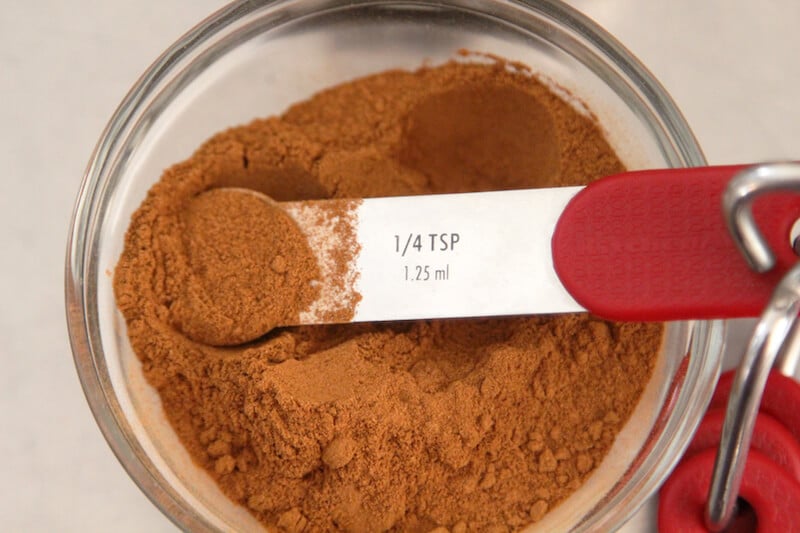Getting a good night’s sleep is essential for overall health and well-being, but insomnia and sleep disturbances are common issues that can impact mental and physical health.
If you’re looking for a natural remedy to help you fall asleep faster and improve sleep quality, nutmeg may be the solution.
Used in traditional medicine for centuries, just ¼ teaspoon of nutmeg could help induce relaxation and promote restful sleep.
Here’s a detailed guide on how nutmeg can improve your sleep and how to use it safely.
How Does Nutmeg Promote Sleep?
Nutmeg offers several properties that make it effective for promoting sleep and easing insomnia symptoms:
- Contains Myristicin: Nutmeg has a compound called myristicin, which has mild sedative effects. Myristicin helps slow down the breakdown of neurotransmitters like serotonin, which can lead to a calming effect and prepare your body for sleep.
- Rich in Magnesium: Magnesium is known to relax the nervous system and muscles, which can reduce stress and anxiety—two major causes of insomnia. Nutmeg provides a small dose of this essential mineral, promoting relaxation.
- Natural Sleep-Inducing Properties: Traditional medicine systems, like Ayurveda, recommend nutmeg for its ability to promote deep, restful sleep without leaving you groggy the next morning.
- Mood-Enhancing Effects: Nutmeg also stimulates serotonin production, which helps regulate mood and promotes feelings of well-being. This can prevent restlessness at night.
How to Use ¼ Teaspoon of Nutmeg for Sleep
Using nutmeg is simple, but consistency is key. Here are a few easy ways to incorporate it into your bedtime routine.
1. Nutmeg Milk (Golden Milk Variation)
This warm, soothing drink is perfect for relaxing your body and mind before bed.
Ingredients:
- 1 cup warm milk (dairy or plant-based)
- ¼ teaspoon nutmeg powder
- ½ teaspoon honey (optional)
- ¼ teaspoon cinnamon (optional, for extra relaxation)
Instructions:
- Heat the milk until warm but not boiling.
- Stir in the nutmeg powder and mix well.
- Add honey and cinnamon if desired for flavor and extra calming benefits.
- Drink 30-60 minutes before bedtime.
Why it works: The warmth of the milk combined with nutmeg’s sedative properties helps your body prepare for sleep.
2. Nutmeg Tea
For those who prefer tea, this simple recipe delivers the sleep-inducing benefits of nutmeg.
Ingredients:
- 1 cup hot water
- ¼ teaspoon ground nutmeg
- 1 chamomile or peppermint tea bag (optional)
- 1 teaspoon honey (optional)
Instructions:
- Add the nutmeg to hot water and let it steep for 5-10 minutes.
- If using, add the tea bag for additional relaxation benefits.
- Sweeten with honey if desired, and sip slowly before bedtime.
3. Nutmeg Smoothie
If you prefer a cold beverage, try adding nutmeg to a nighttime smoothie. A banana-nutmeg smoothie works especially well, as bananas are high in magnesium and potassium, both of which promote relaxation.
Ingredients:
- 1 ripe banana
- 1 cup almond milk
- ¼ teaspoon nutmeg
- 1 tablespoon almond butter (optional)
Instructions:
- Blend all ingredients until smooth.
- Drink 1 hour before bed to enjoy its calming effects.
Safety Precautions
While nutmeg offers many benefits, it’s important to use it in moderation. Consuming too much nutmeg—more than 1 teaspoon—can cause unpleasant side effects, including nausea, dizziness, and hallucinations, due to its psychoactive properties.
- Stick to ¼ teaspoon: This amount is safe and effective for promoting sleep without causing side effects.
- Avoid Nutmeg Overuse: Limit your intake to once a day to prevent any buildup of myristicin.
- Consult Your Doctor: If you’re pregnant, breastfeeding, or have any medical conditions, consult your healthcare provider before using nutmeg regularly.
Additional Tips for Better Sleep
Nutmeg works best when combined with healthy bedtime habits. Here are some additional tips to improve your sleep quality:
- Maintain a Regular Sleep Schedule: Go to bed and wake up at the same time every day, even on weekends.
- Limit Screen Time: Avoid screens at least an hour before bed, as blue light disrupts melatonin production.
- Create a Relaxing Bedtime Routine: Include activities like reading, journaling, or meditation to wind down.
- Keep Your Room Cool and Dark: A cool temperature and dark environment promote deeper sleep.
- Avoid Caffeine and Heavy Meals: Cut off caffeine in the afternoon and avoid large meals close to bedtime.
Using ¼ teaspoon of nutmeg is a simple and natural way to help relieve insomnia symptoms and promote restful sleep.
